Со слов Бертольда Брехта: «Наука знает только одну заповедь — внести вклад в развитие науки», в Риме (Италия) начала работать
Ведущие хирурги мира говорили о колоректальной хирургии и паховых грыжах, о гемостатиках и осложнениях в хирургии, о причинах образования камней желчного пузыря и рефлюксных эзофагитах. Но основной темой конференции была трансляция операций в реальном времени из ведущих научных хирургических центров европейский стран (в том числе из Италии), России и США.
Конференция дала уникальную возможностью сопоставления, обсуждения и корректировки различных техник операционных вмешательств. Показ операций со всего мира в режиме реального времени с прекрасным аудиовизуальным качеством позволил участникам конференции увидеть и осознать каждую деталь, а также получить уточняющую информацию непосредственно от хирурга. Специалисты со всего мира могли наблюдать за виртуозной работой практикующих хирургов при помощи Интернета на сайте www.laparoscopic.it
На форуме было организовано около 100 телемостов из ведущих мировых клиник. Были показаны как традиционные, так и лапароскопические операции. Российскую хирургию представлял профессор Константин Пучков.
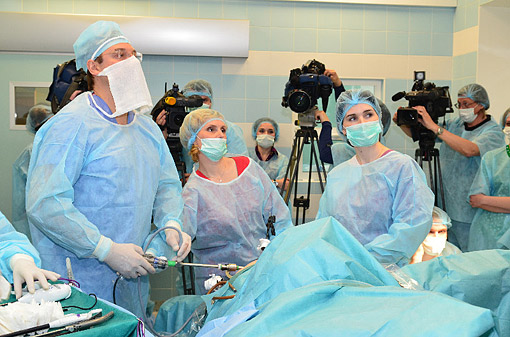
Съемки российских телекомпаний во время трансляции в Рим
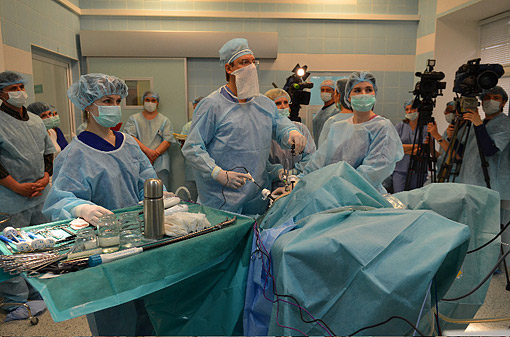
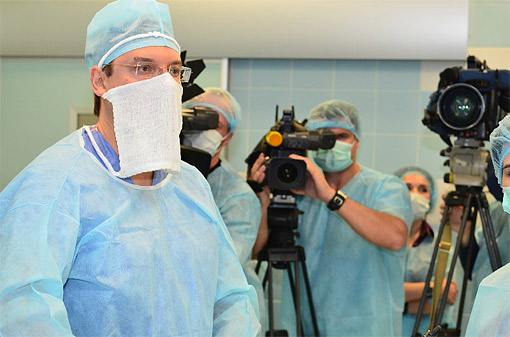
Профессор Константин Пучков
В реальном времени из московской операционной в Рим шла трансляция операции пациентке по поводу грыжи пищеводного отверстия диафрагмы и
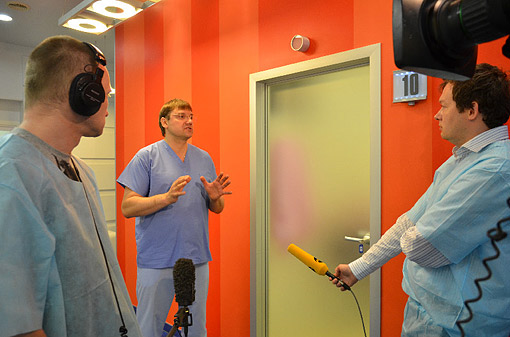
Константин Пучков дает интервью российским журналистам
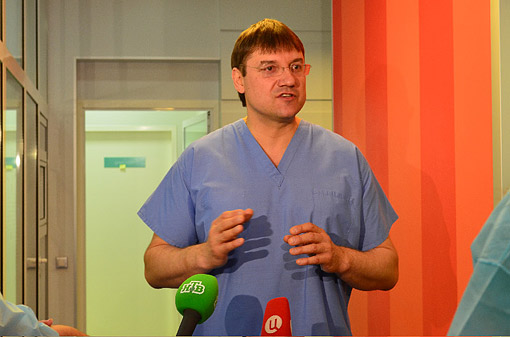
НТВ Утром
Канал ТВЦ. Новости
Russia Today.
Репортаж испанской редакции телеканала
Russian surgeon shares knowledge with colleagues worldwide
Russia Today.
Репортаж английской редакции телеканала
Russian surgeon shares knowledge with colleagues worldwide
Источник: Russia Today
For the first time Russian surgical expertise comes under the international spotlight as renowned laparoscopic surgeon Konstantin Puchkov performs a live operation broadcast to hospitals around the world.
The laparoscopic removal of an oesophageal hernia from a woman’s abdomen was performed by Dr Konstantin Puchkov, a leading specialist in his area in Russia. The surgery lasted 40 minutes as opposed to the traditional two and a half hours. It was transmitted to Rome where the 22nd Digestive Apparatus Surgery Conference is being held on
The 5,000 people who were present at the conference in Rome and around 15,000 other surgeons from around the world were able to watch the live broadcast of this particular procedure and 29 other surgical operations simultaneously performed in different countries of the world.
Dr Puchkov is the leading surgeon in this area in Russia. He explained to RT what the main difference is between this particular way of removing a hernia and the traditional, more invasive, procedure:
«This type of surgery is called
RT’s Irina Galushko has spoken to Larisa Daineko, a patient, who has just undergone a similar operation last night.
«I didn’t have to prepare for this surgery, unlike before," she said. «I came in the morning, had the surgery last night, and I’m feeling fine. It’s a lot less straining emotionally. I can even walk — I got up on my own this morning.»
Dr Puchkov has spent the last 10 years travelling all around the world and participating in various workshops and studying abroad. He has studied in France, US, Singapore and holds numerous certificates from all over the world. He believes the more you study, the more you pick up something new — especially in this field. He also passes on this knowledge to other doctors all around the country. At this point there are several thousand surgeons in Russia who perform similar laparoscopic procedures. Unfortunately, not every patient can afford such a procedure, but Dr Puchkov says he is glad to be able to perform them for free for those who don’t have insurance.
«At this time this type of equipment is not available in all our hospitals. But the government is allocating a lot of money for such programs all across the country, and I think we’ll get there soon.»
This particular method of surgery is spreading rapidly across the country and Dr Puchkov believes it’s just a matter of time before this procedure l finally replaces the widely used invasive surgery.



